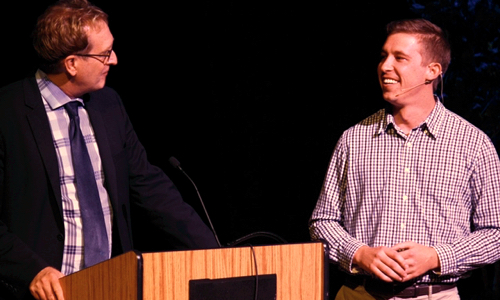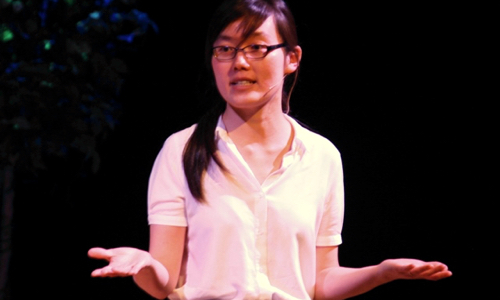Twelve UC Santa Cruz graduate students provided brief glimpses into their ongoing research in the third annual campuswide Grad Slam, a three-minute elevator pitch competition to encourage better storytelling about complex academic topics.
John Felts, a second year Ph.D. electrical engineering student, earned top marks for his talk about creating environmentally friendly surfboard foam from the shells of shrimp. He won $3,000 and the opportunity to compete in a UC-wide competition on May 4.
Sam Mansfield, whose research into how technology can help avoid the epidemic of bed sores among the elderly and most vulnerable, earned second place honors and $1,500. He also won the coveted People’s Choice Award, which came with a $750 prize.
A community panel comprised of leaders in government and the nonprofit sector judged the Friday event held on campus. About 190 attendees were invited to vote on their favorite presentation.
“This is an opportunity for students to think about communicating their work to a general audience and to consider the potential impact of scholarships and researchers on their everyday lives,” said Tyrus Miller, vice provost and dean of Division of Graduate Studies, who emceed the event. “An event like this takes their specialized work out of the ivory tower and makes it meaningful to the general public.”
It was a night of stiff competition for the finalists who had the unenviable task of reducing their academic passions—from primordial black holes and cleft lip speech therapy to feminist cinema theory and the far-reaching benefits of soil microbes—into a mere 240-second presentation.
“We are not judging the merit of the research, but on students’ ability to tell a story,” said Sonya Newlyn, a program assistant who helped organize the event.
The program encourages students to better communicate the potential impact of their research, a critical skill for any academic working on issues of the day that may call for funding or legislative actions. Similar competitions, based on the Three Minute Thesis competition developed by the University of Queensland, are held on university campuses all over the world.
This year’s UC Santa Cruz participants were selected from a group of 32 graduate students who submitted video presentations about a thesis or dissertation earlier in the school year. Finalists presented research from diverse areas including: digital arts and new media; physics; computer science; microbiology and environmental toxicology; environmental studies; molecular, cell, and developmental biology; film and digital media; computer engineering; computer science; earth sciences; and electrical engineering.
“We’re understanding that we can’t just do our specialized work and assume it’s going to have the impact it could have if we were reaching out and bringing people into our thinking,” Miller said. “Bridging that gap is more important now than ever.”
In his winning presentation, Felts talked about how he has been studying the potential of chitin—or shrimp shell material—to replace polyurethane and polystyrene foams with Marco Rolandi, associate professor of Electrical Engineering. The foam currently used in most surfboards has a lifespan of hundreds of years and is detrimental to the environment. Rolandi and Felts have two related provisional patents and are exploring other ideas for the use of chitin and other naturally occurring biomaterials.
“It’s important to relate the benefits of our research so people can really understand what we’re doing and the importance of it,” Felts said. “The Grad Slam is really useful for developing those tools.”
Mansfield is a third year doctoral student working on the Bed Sore Detection and Prevention project with Katia Obraczka, a computer engineering professor, and UC San Francisco. The goal of the project is to create a sensor network that monitors a patient to determine when a bedsore will form and avoid such formations.
This panel of judges included Cynthia Chase, Santa Cruz mayor; Zach Friend, Santa Cruz County supervisor; Cynthia Mathews, Santa Cruz councilwoman; Carolyn O’Donnell Shimek, California Strawberry Commission communications director; Lynda Rogers, UCSC University Extension dean; Nina Simon, Santa Cruz Museum of Art and History executive director.




